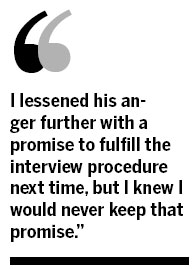Forum
Problems occur when a reporter jumps red tape
By Li Jiabao (China Daily)
Updated: 2010-07-07 11:05
 |
Large Medium Small |
When I was sent to cover a demolition story late June, I was excited.
A village in southern Beijing's Daxing district was to be removed to give way to commercial development. Demolitions always spark conflict so I had a high expectations of a good story, but I never expected it would turn out to be such an adventure.
With a photographer and a driver in tow, I left for the village.
Although the driver had a map on hand, we still got lost thanks to the complicated country roads. We stopped in front of the local township government building and I volunteered to go in and ask for directions.
My mention of Baoshan village seemed to alert them, prompting many questions. I told them the truth and a female employee asked me to have a chat with their director, surnamed Cui.
I talked about my assignment, which produced an surprising result - the director nodded and showed us the way to the village.
I found myself immediately surrounded by villagers, who eagerly shouted out their stories. They complained about low compensation, the difficulty to rent a new house and the possible harassment if they did not move out before the deadline.
I lost myself in the stories and had no idea that two plainclothes security men were casting their suspicious eyes across me. They came over and invited me to the "demolition headquarters". I agreed, not because of their promise of having lunch with their leaders, but for a golden chance to interview an official in charge of the project.
The official greeted me with a cold face in the passage of a shabby building as the two men stood quietly behind me.
"Where is your working ID card?" the official questioned. I showed it to him. He grasped it and held it firmly in his hand.
"You can get out now but your working card is seized!"

The idea of grabbing back my card and fighting my way out came to mind, but I controlled my anger. Instead, I prompted a mostly one-way conversation that felt something like an angry teacher telling off a naughty schoolboy.
"Who sent you here? Don't you know how dangerous it is? You never know! Who is your leader?" he questioned.
I really wanted to answer, but there was no chance to jump in.
"How do I know your card is valid? Anyone can make a copy just like this! What would you do if I tore it into pieces?" he roared.
He looked at me expecting an answer, but I just gave a shrug.
The two men near the door then asked me if I wanted some water, which I turned down.
After a short rest, the official started his questioning again, so I took my chance to respond.
"What is the rank of your company?" he asked.
"It is a national newspaper." I answered, softly but quickly.
It worked. He paused and gave me a strange look, then changed his tone into one of a lecturer.
"Your newspaper is high-class, far different from tabloids. You should have followed the interview procedures and informed the district government and then the town government and finally our headquarters. We are glad to talk with the media," he said, this time more softly.
I lessened his anger further with a promise to fulfill the interview procedure next time, but I knew I would never keep that promise - by doing so, I would get nothing.
About one hour later I walked out of the small room with my working card back in my hand. If an experience can be described as a chocolate, this would have been a little bitter but wonderfully delicious.
China Daily